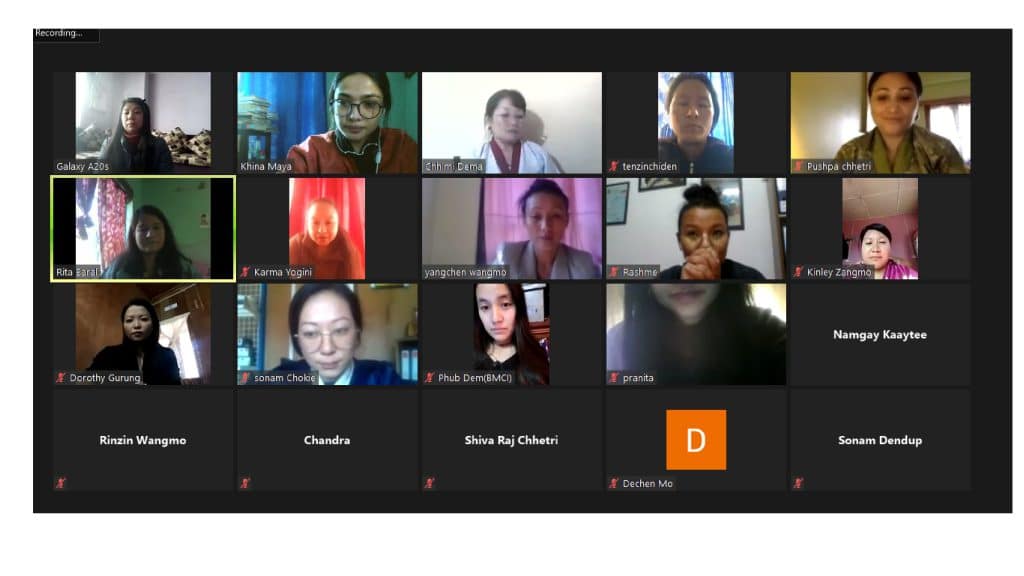Different women entrepreneurs have been affected differently by the pandemic
As the Bhutanese economy grapples with the Covid-19 pandemic, women entrepreneurs say they have been bracing the situation in their own ways with no specific intervention to support them.
The fact is that they are also hit by the pandemic differently than the rest. This was revealed when about 20 women entrepreneurs from around the country discussed the impact, solutions and potential business opportunities for women entrepreneurs during the pandemic through a webinar late last month.
In her welcome address, Director Bhutan Media and Communications Institute (BCMI) Pushpa Chhetri, said, “The pandemic has brought additional burden to women’s lives especially in the informal, micro and small businesses leaving many jobless and vulnerable to more injustices including domestic violence and exploitation.”
Ms.Veena Vidhyadharan from CUTS International in her keynote address said that in developing countries women make about 33% of the workforce in firms and sectors that are engaged in trade. Highlighting the impacts of Covid-19 on trade and industries around the world, she said that women are largely affected by this pandemic because many women are involved in areas like micro enterprises, import and export businesses, cross border trade, service and hospitality industries, beauty and care industries etc. and livelihood of women working in these areas is most affected by the pandemic.
The pandemic has also increased unpaid care works for women .The participants said that they are faced with a double burden during the pandemic and lockdown such as having to bear additional responsibilities of a homemaker. They feel the need to collectively raise their voices on breaking the stereotypical thinking that housework is only a woman’s domain and make people understand that it should be a shared responsibility just as in running business and office.
Meanwhile, different entrepreneurs have been affected differently by the pandemic.
Dorothy Gurung, a fashion designer and owner of a fashion house, said, “I was earning good but after the pandemic hit our country, I was only able to pay the staff and rent for three months then I had to close my business.”
Tenzin, who owns a scrap business in Samdrup Jongkhar said that due to the lockdown and travel restriction, she is neither able to bring scrap from other dzongkhags nor is she able to export to India.
Monu Pradhan, an established exporter from Phuentsholing, said that Covid-19 has affected her business since transportation policies have become stricter and complicated and during the first lockdown she couldn’t export on time.
Chimi from Gelephu said that she has been facing issues related to finance. She is not sure why she is not able to get funds to sustain her business although there are so many financial institutions and schemes in Bhutan.
Another participant shared that she runs a flower nursery and due to the Covid-19 her sales have gone down and she is having difficulty to sustain her business. Likewise there were others who shared similar challenges in sustaining their businesses, being unable to pay their employees and workers on time, unable to market their products etc.
However, some participants have been more fortunate. They see a huge opportunity in diversification of their products. For example, sanitary-pad maker was facing difficulty in importing raw materials. However, instead of closing her business, she started the production of facemasks. Some also see opportunities on production of various raw materials because at present most of the businesses import raw materials, and packaging materials among others.
Likewise technology has also helped some women entrepreneurs to continue with their businesses despite the situation.
Sonam Chokei, an entrepreneur based in Paro, makes use of digital platforms and e-shops available in Bhutan like Zala.bt, DrukSell, AzhaPasa and other social media platforms like Facebook and Instagram to market her products.
She said, “There is an enormous opportunity for Bhutanese entrepreneurs in digital platforms, if explored and utilized productively.”
She emphasized on the need of digitalization in Bhutan especially in regards to marketing and entrepreneurship. She said that Bhutanese women are either not aware or lack skills in making use of such platforms which can lead to reduced operating cost and better connectivity with customers around the world.
Monu Pradhan said, “It is much more convenient now with the Internet and technology. I don’t have to travel or be present everywhere.”
She said she could talk or e-meet with clients and importers and also market her products using online platforms.
Likewise, one participant mentioned that her photo studio sometimes needs to outsource to people from outside but if Bhutanese women can learn those skills they can earn while working from home.
On a positive note, some of the participants also feel relieved that the pandemic has allowed them to spend more time with their family and take care of their children.
The webinar was organized by BMCI as a country partner in Bhutan as a part of a regional project on Gender Dimensions to Trade Facilitation supported by UKAID and led by CUTS International in the sub-region.
Staff Reporter from Thimphu













